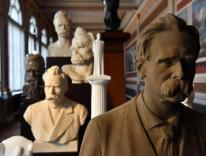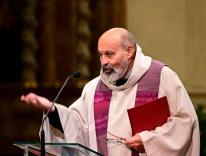The scientific discoveries of the past four centuries are the most significant intellectual achievement in human history. We have come to understand the deep structure of the universe, and used this understanding to improve the quality of human life in previously unthinkable ways. Moreover, we have eliminated the need for supernatural explanations of natural phenomena, and shown that many of the miracles postulated by past generations are incompatible with the laws that govern the physical universe. After the arrival of science, the only place for religion is in the minds of the simple-minded.
So goes a popular story about science and religion, which seems to leave the would-be believer forced to choose between two options. The first is to adopt a position of hostility toward science, or at least those portions of scientific knowledge that threaten religious belief most directly. The second is to conclude that, since science isn’t about to go away, then any religion that remains must be mostly insubstantial, shorn of commitment to a personal God who intervenes in the course of history. Either way, the consequences of the science-religion dialectic are generally thought to be zero-sum, always favoring one side at the expense of the other. Different people choose differently, but everybody has to choose.
In Where the Conflict Really Lies, the philosopher Alvin Plantinga argues that this popular story gets things precisely backwards. Plantinga, a devout Protestant who taught at Notre Dame for almost thirty years until his recent retirement, now holds a chair at Calvin College, his undergraduate alma mater. Over the past fifty years Plantinga has been one of the most influential philosophers in the world. His past books include God and Other Minds (1967), where he argues that belief in God can be rational even if not grounded in sufficient evidence; The Nature of Necessity (1974), a work of metaphysics that includes a response to the problem of evil and a rehabilitation of St. Anselm’s “ontological argument” for the existence of God; and Warranted Christian Belief (2000), a philosophical defense of the reasonability of Christian faith. Following the publication of two books co-written with prominent atheist philosophers—Knowledge of God (2008) with Michael Tooley and Science and Religion (2010) with Daniel Dennett—Plantinga’s aim in Where the Conflict Really Lies is to show that far from being incompatible, science and religion are mutually supportive, since commitment to science undermines the belief that the natural world is all there is.
Stated more precisely, Plantinga’s thesis is that there is superficial conflict but deep concord between science and religion, and superficial concord but deep conflict between science and naturalism. By “religion,” Plantinga means any form of what philosophers call theism, or the belief that there exists an all-powerful, all-knowing, and perfectly good God who has something to do with human affairs. (Thus Judaism and Islam are included, though the details of Plantinga’s position are unmistakably Christian.) “Naturalism,” by contrast, is the belief that there is no God, and that natural science provides an exhaustive account of what there is. Plantinga aims to show, superficial appearances notwithstanding, that the religious worldview is more concordant with science than the naturalistic one.
Like any work of academic philosophy, Where the Conflict Really Lies is argumentatively complex. But Plantinga is an engaging writer. The most challenging aspect of his argument is not any technical terminology, but rather his reliance on a way of measuring probability developed by the eighteenth-century mathematician Thomas Bayes. Bayes provided a rigorous way of calculating what is called the “conditional probability” of a claim, or the probability that a claim is true given certain background assumptions. And Plantinga’s strategy is to argue, using Bayes’s method, that the probability of our having scientific knowledge is very high on the assumption of theism, whereas assuming naturalism makes this probability much lower. If we were made in the image of a loving God, then it is likely that we are able to have scientific knowledge; but if our minds are the result of a blind process of natural selection, then our having this capacity is quite improbable.
To prove the second half of this thesis, Plantinga notes that most naturalists endorse some form of materialism, according to which the mind is identical to the brain. Moreover, he says, naturalists hold that human nature is the product of evolution by natural selection, and such selection ensures only that we behave adaptively, or in ways conducive to reproductive success. Plantinga then argues that our minds do not have to be any good at apprehending the objective truth about the world in order for our brains to have evolved in a way that enables adaptive behavior. For, again, if materialism is true, then our actions are caused not by true beliefs but solely by the material properties of our brains and bodies.
If this argument is sound, then it raises a serious problem for philosophical naturalism. For central to the naturalistic worldview is the idea that science provides an authoritative account of reality. But if this worldview also entails that we are unlikely to be any good at doing science, then naturalism is as self-defeating as the belief that one does not exist. (As Augustine and Descartes observed, only someone who exists can believe anything at all.) If we are to be rational in thinking that our scientific theories are true, it should not be a consequence of our worldview that the truth of our theories is highly improbable. Thus, Plantinga holds that well-grounded scientific theories like the Darwinian account of evolution are perfectly in order, but the combination of those theories with materialistic naturalism leads to a position that is “self-referentially incoherent,” and cannot rationally be accepted.
This argument against naturalism is unlikely to persuade many philosophers. Materialists believe that the mind’s ability to determine our behavior is rooted in the material properties of the brain. But they need not believe that the contents of our mental states—that is, what they represent—are entirely irrelevant to their causal powers. For example, many materialists would say that part of what makes a certain mental state count as the belief that a tiger is nearby is the way that mental state will combine with the same person’s fear of tigers to lead her to seek a place to hide. Any mental state that lacks this feature cannot be the belief that a tiger is nearby. So in order for us to evolve brains that cause adaptive behavior, we must also have evolved reliable cognitive faculties.
This doesn’t mean that philosophical naturalism is out of the weeds when it comes to explaining our capacity for scientific understanding. First, there are many very general problems with the idea that mental states are identical to brain states, including the difficulty of understanding how this thesis doesn’t drain the mind of any causal powers whatsoever. Second, even if naturalists can explain why our cognitive faculties are reliable enough to have kept our evolutionary ancestors from being eaten by tigers, this alone may not explain our capacity for abstract scientific and philosophical reflection. Nevertheless, as it stands this portion of Plantinga’s argument does not seem successful.
Even so, Plantinga’s book is a significant achievement. He succeeds in undermining the zero-sum view of science and religion as natural enemies, by showing that belief in God supports a commitment to scientific understanding, and that our best scientific theories do not rule out religious ideas like the possibility of divine intervention in the universe. (Plantinga’s treatment of this last subject is especially good.) And it would indeed be a good thing if public discussions of religion and science were reoriented along these lines, not least because it might lead more committed Christians to abandon their hostility to legitimate scientific discoveries.
Within the academy, however, the committed naturalist will likely regard this as a low bar to clear, since the fact that certain beliefs are compatible, or even that one belief is likely given another, says nothing at all about whether any of them are correct. In other words, it is one thing to show that it’s “rational” to be a theistic believer committed to the truth of science, another to show the truth of theism when there are other systems of belief that are equally coherent. By contrast, since any inconsistent position is plainly irrational, proving that naturalism is self-contradictory would provide even a naturalist with sufficient reason to give it up. Yet as we have seen, Plantinga’s arguments for this latter thesis are highly problematic, as they rest on an understanding of philosophical materialism that almost no naturalistic philosopher would accept. We are left, then, with a standoff: religion and naturalism are both compatible with science, and which position a person should adopt hinges on his or her prior commitments. Perhaps this is the best that a human knower can do. But even by Plantinga’s own lights, such an argument should not be enough to convince a committed naturalist that he or she is wrong.


